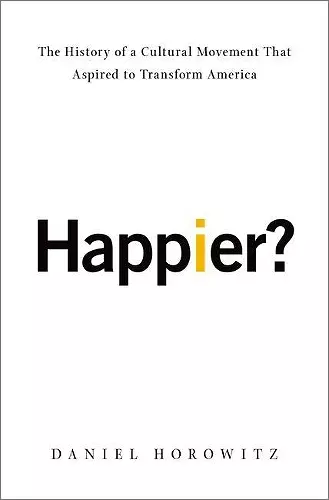Happier?
The History of A Cultural Movement that Aspired to Transform America
Format:Hardback
Publisher:Oxford University Press Inc
Published:4th Jan '18
Currently unavailable, and unfortunately no date known when it will be back

When a cultural movement that began to take shape in the mid-twentieth century erupted into mainstream American culture in the late 1990s, it brought to the fore the idea that it is as important to improve one's own sense of pleasure as it is to manage depression and anxiety. Cultural historian Daniel Horowitz's research reveals that this change happened in the context of key events. World War II, the Holocaust, post-war prosperity, the rise of counter-culture, the crises of the 1970s, the presidency of Ronald Reagan, and the prime ministerships of Margaret Thatcher and David Cameron provided the important context for the development of the field today known as positive psychology. Happier? provides the first history of the origins, development, and impact of the way Americans -- and now many around the world -- shifted from mental illness to well-being as they pondered the human condition. This change, which came about from the fusing of knowledge drawn from Eastern spiritual traditions, behavioral economics, neuroscience, evolutionary biology, and cognitive psychology, has been led by scholars and academic entrepreneurs, as they wrestled with the implications of political events and forces such as neoliberalism and cultural conservatism, and a public eager for self-improvement. Linking the development of happiness studies and positive psychology with a broad series of social changes, including the emergence of new media and technologies like TED talks, blogs, web sites, and neuroscience, as well as the role of evangelical ministers, Oprah Winfrey's enterprises, and funding from government agencies and private foundations, Horowitz highlights the transfer of specialized knowledge into popular arenas. Along the way he shows how marketing triumphed, transforming academic disciplines and spirituality into saleable products. Ultimately, Happier? illuminates how positive psychology, one of the most influential academic fields of the late twentieth and early twenty-first centuries, infused American culture with captivating promises for a happier society.
Horowitz's study is primarily an intellectual one. Indeed, now that he has laid the groundwork with this thorough intellectual history of the movement, scholars can turn their efforts to understanding how Americans used what they learned in happiness-oriented therapies, training, and books. * The American Historical Review *
Horowitz helps us see the extensive reach of psychology into American lives. And he raises the provocative question of whether happiness studies have really made us happier or whether they have lulled us into the false sense that social reforms are unnecessary. * Journal of American History *
Happier contributes to a rethinking of how to periodize the history of psychology. Horowitz's analysis suggests psychology underwent an effective revolution around the turn of this century. The history of this effective revolution remains unwritten, but Happier along with other recent titles is suggestive of its broad contours. As such, the book is essential reading for historians of psychology. * Journal of The History of the Behavioral Sciences *
ISBN: 9780190655648
Dimensions: 160mm x 236mm x 33mm
Weight: 558g
320 pages